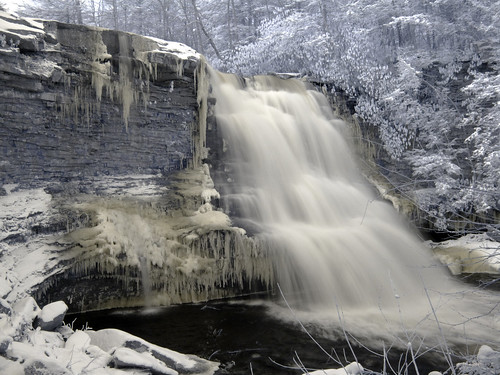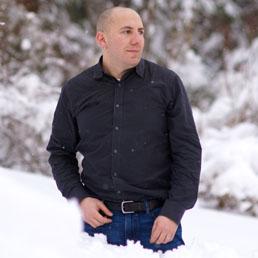 Steeped in a world of mythical monsters of the woods and ghosts that help the characters on their rightful paths, Alexi Zentner’s debut novel, Touch, examines the history of the town Sawgamet and its founders – the Boucher family.
Steeped in a world of mythical monsters of the woods and ghosts that help the characters on their rightful paths, Alexi Zentner’s debut novel, Touch, examines the history of the town Sawgamet and its founders – the Boucher family.
The story starts with an ending of sorts, the narrator Stephen Boucher has returned to Sawgamet, a small mill town, after more than a decade away, to tend to his dying mother. Stephen, an Angelican priest, grew up steeped in Sawgamet lore and knows the stories of its monsters from a child’s intimate vantage. On the eve of his mother’s passing, Stephen recalls the history of his grandfather’s and father’s lives and deaths. Through these memories, a tale of tragedy slowly unfolds.
Zentner delves into the past through the characters of Stephen’s childhood – his grandfather, Jeannot, his father, Pierre, and Father Earl, his stepfather. Indeed, Father Earl’s retirement as priest at the Anglican Church in Sawgamet also plays a role in Stephen’s return. The gold rush/mill town of Sawgamet, founded by Jeannot Boucher, comes alive with vivid detail: paths cut through ancient woods, riverbanks bear town lore downstream, and the small town’s residents take shape. They start as men looking for gold, and later become masters of the mill and store owners. Zentner shows how river and woods comprise Sawgamet’s livelihood and define the residents.
The river froze inward, flat and even near the banks at first, but by November even the fast-moving water at the center of the river, the dangerous meeting of the Sawgamet and the Bear Rivers, had iced over. Daylight fading, we skated on the river after school while shoreline bonfires raged, giving us a place to warm our hands. Girls played crack the whip while the men and boys played hockey on the broad run of ice swept clear of snow.
Through stories, the reader becomes part of Sawgamet’s history, a history passed down for three generations.
Zentner’s O’Henry Award-winning short story, also titled “Touch,” is mixed into the first chapter of the novel. Setting a foreboding tone for the rest of the novel, the opening chapter tells the history of the death of both father and sister during Stephen’s tenth year. After the Bouchers fall prey to the icy Sawgamet winter, cold and death become themes in the novel that never waver. Zentner returns to these motifs throughout the novel with different characters, during different winters in Sawgamet, but the results are always the same. Consider this passage where Father Earl experiences the spine-tingling power of the woods:
And even before he took another step, he knew there should only be shape, knew that there was only one boulder encrusted by snow. He knew then, and he would always know, that if he had the courage to look back into the storm he would have found her, would have been able to carry her home, would not have left her to turn into a pillar of salt.
Grief and loss embroider the novel, but Zentner’s careful balancing of the living and the dead gives the reader faith that somewhere amid the tragedy an ember of hope survives. Stephen’s return – despite his family’s afflictions – feeds that hope.
In Touch, Stephen reflects on the hardship of returning Sawgamet, especially as he must watch his mother die. But he questions his memory of the past, wondering why on this of all nights, his mother’s death looming, the sadness that has shrouded the Boucher family for so many years comes flooding back to him.
My whole life is, in some ways, about faith. And I do have faith in these stories about the history of my family. I would not be back here if Father Earl had not asked me to return, but I have faith that there is a greater reason why I am back here in Sawgamet, raising my daughters in a place that has taken so much from my family and me: I have faith that there is something that I can reclaim.
By scrutinizing the past and holding it up to the light, Stephen reclaims his home. He recounts the summer of his tenth year when his grandfather returned to Sawgamet. Jeannot filled the boy with myth and family lore in the months that followed.
The stories enthrall the reader, just as they do the boy Stephen – a fabulous golden caribou and a mahaha (a creature that tickles you until all your breath is gone), cannibalism, arson, and a vengeful ghost – but it is Zentner’s writing that elevates these chimeras and gives the novel its heft. Zentner writes Stephen as an inquisitive adult, a quiet child, and a confused teenager. As he faces his mother’s coming death, Stephen broods over mortality. It becomes the topic of most of his stories.
An example of Zentner’s ability to capture the wonderment of death comes early in the novel during the story of Jeannot’s founding of the town:
He did not understand the simple signs of tiredness, of having gone beyond the limits of his endurance, and for the first time of many times throughout his life, my grandfather, Jeannot Boucher, thought with absolute certainty that he must be dying.
This passage contains a microcosm of the whole of Touch: the elegant interdependence of past and present, history and myth, loss mingled with a faint but hearty hope. Stephen’s family grows accustomed to death – they must – but never comfortable with its monstrous, unknowable properties.
Zentner brings Touch together through the Boucher family’s recurring bereavement, but connects to the reader through the hope that persists in the characters despite the loss of loved ones, houses, and family. Jeannot returns to Sawgamet to “raise the dead.” Stephen returns to bury his mother and reclaim his home. Father Earl retires after seeing his first and second wives pass away. As Emily Dickinson put it: “Hope is the thing with feathers.” Hope is the real magical beast – the phoenix – of Zentner’s novel. The creatures, the ghosts, the myths – they are real in Sawgamet, and they are real to the enthralled reader. But the ability to get back up and go on despite loss, that is the story Sawgamet, of the Boucher family, and, ultimately, of mankind. Zentner captures it beautifully.
Further Links and Resources
He had not been thinking of death that morning when he came out of the woods and into the higher meadow, stopping to rest on a rough boulder.









